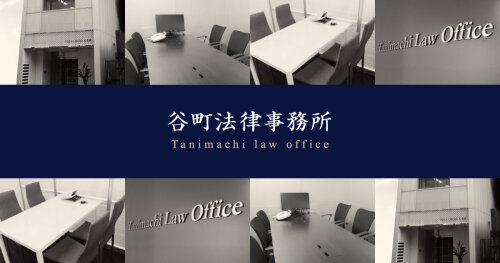Best Toxic Mold Lawyers in Osaka
Share your needs with us, get contacted by law firms.
Free. Takes 2 min.
List of the best lawyers in Osaka, Japan
About Toxic Mold Law in Osaka, Japan
Toxic mold, also known as “black mold” or “dangerous mold,” can present serious health risks and property damage concerns for residents and property owners in Osaka, Japan. Mold thrives in damp or poorly ventilated environments, which are not uncommon in Osaka’s humid climate. Health impacts may range from allergic reactions and asthma to more severe respiratory conditions. When toxic mold is discovered in residential or commercial properties, determining responsibility, seeking remediation, and recovering damages can quickly become legal matters. Understanding your legal options and obligations, as well as the local laws that govern these issues, is essential for both tenants and property owners.
Why You May Need a Lawyer
Legal assistance is often necessary in toxic mold cases for several reasons. Common situations include:
- Disputes between tenants and landlords over responsibility for mold remediation
- Landlords or property managers failing to act promptly on tenant complaints about mold
- Health complications or property damage caused by toxic mold exposure
- Issues regarding insurance coverage for mold-related damage
- Claims for compensation if mold was undisclosed during property purchase
- Needing support in negotiations or litigation, especially if significant repairs are needed or liability is unclear
A lawyer can help you interpret inspection reports, negotiate with landlords or insurance companies, and represent you in legal actions to recover damages or force remediation.
Local Laws Overview
In Japan, property law and leasing contracts are governed by the Civil Code and additional legislation. While there is no specific nationwide law solely for toxic mold, Osaka follows these broader regulations, which assign obligations for property upkeep and inhabitability. Landlords must provide and maintain rental properties in a condition fit for habitation, which includes addressing mold, especially if caused by structural issues or water intrusion. If a landlord neglects necessary repairs, tenants may have the right to demand action, seek rent reduction, or terminate their lease. However, if mold is due to tenant negligence, liability may shift. Lawsuits regarding mold often invoke claims of breach of contract, tort, or consumer protection laws in Japan.
Frequently Asked Questions
What is considered toxic mold?
Toxic mold usually refers to mold varieties like Stachybotrys chartarum, which can produce harmful mycotoxins. However, any excessive mold accumulation indoors can cause health issues and property damage.
Who is responsible for removing toxic mold in rental properties?
Responsibility depends on the cause. Landlords are typically obligated to repair leaks or structural defects that lead to mold. If mold results from tenant neglect, tenants may need to address the problem or compensate the landlord.
What should I do if I discover toxic mold in my apartment?
Notify your landlord or property manager in writing as soon as possible and request investigation and remediation. Keep records of all correspondence and take photos of the affected areas.
Can I withhold rent until the landlord fixes the mold problem?
Japanese law does not automatically allow tenants to withhold rent. Legal options include negotiation, requesting rent reduction, or seeking mediation, but you should consult a lawyer before withholding payment.
What health issues can toxic mold cause?
Toxic mold can cause allergic reactions, skin irritation, asthma exacerbation, and respiratory problems. More severe exposure may result in long-term health consequences, especially for vulnerable individuals.
How can I prove a mold problem in my property?
Document the issue with photographs or videos, obtain inspection reports from certified environmental inspectors, and collect any medical records linking your symptoms to mold exposure if applicable.
Are landlords required to provide mold inspection reports to tenants?
There is no specific legal requirement to provide mold inspection reports by default, but landlords are obligated to disclose material facts that affect the safety or habitability of the property.
Can I break my lease if there is toxic mold?
If a property is uninhabitable due to toxic mold and the landlord fails to address the issue, you may have grounds to terminate the lease. It is advisable to seek legal advice and follow proper procedures.
What compensation can I claim in a toxic mold case?
Potential claims include medical expenses, costs of alternative accommodation, property damage, lost wages due to illness, and in some cases, damages for pain and suffering.
Is insurance likely to cover toxic mold damage?
Coverage varies by the specific insurance policy. Some property or renter’s insurance may exclude mold damage, while others may cover it if linked to a covered peril like a pipe burst. Review your policy and consult your insurer for clarification.
Additional Resources
If you require further information or support regarding toxic mold issues in Osaka, you can contact the following organizations and resources:
- Osaka Municipal Government - Environmental Health Division (provides guidance and support on living environment issues)
- Japan Legal Support Center (Houterasu) - Offers free or low-cost legal consultation services
- Local public health centers in Osaka - For health and environmental advice
- Osaka Bar Association - Can refer you to a lawyer with experience in housing or environmental law
- Real estate and tenancy dispute mediation services, often available through local government offices
Next Steps
If you believe you have a toxic mold problem that has led to health concerns or property disputes in Osaka, the following actions are recommended:
- Document the mold problem thoroughly, including photos and written reports
- Notify your landlord or property manager in writing and request prompt remedial action
- Keep all correspondence, bills, inspection reports, and medical records related to the issue
- Seek medical attention if you experience health problems linked to mold exposure
- Consult with a lawyer specializing in tenancy or environmental issues to assess your rights and potential claims
- If mediation with your landlord does not resolve the matter, consider using official dispute resolution services or proceeding to court with legal representation
Acting early, staying organized, and consulting professional advice can help protect your health, your property interests, and your legal rights regarding toxic mold in Osaka, Japan.
Lawzana helps you find the best lawyers and law firms in Osaka through a curated and pre-screened list of qualified legal professionals. Our platform offers rankings and detailed profiles of attorneys and law firms, allowing you to compare based on practice areas, including Toxic Mold, experience, and client feedback.
Each profile includes a description of the firm's areas of practice, client reviews, team members and partners, year of establishment, spoken languages, office locations, contact information, social media presence, and any published articles or resources. Most firms on our platform speak English and are experienced in both local and international legal matters.
Get a quote from top-rated law firms in Osaka, Japan — quickly, securely, and without unnecessary hassle.
Disclaimer:
The information provided on this page is for general informational purposes only and does not constitute legal advice. While we strive to ensure the accuracy and relevance of the content, legal information may change over time, and interpretations of the law can vary. You should always consult with a qualified legal professional for advice specific to your situation.
We disclaim all liability for actions taken or not taken based on the content of this page. If you believe any information is incorrect or outdated, please contact us, and we will review and update it where appropriate.









